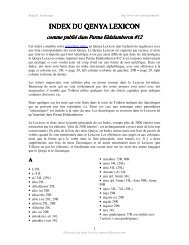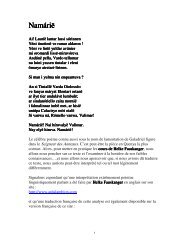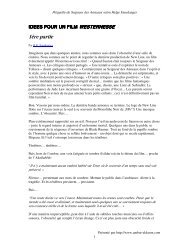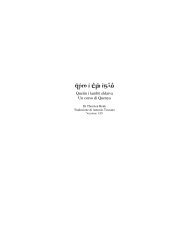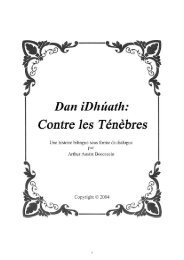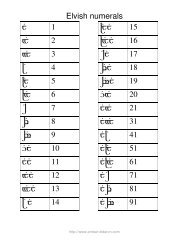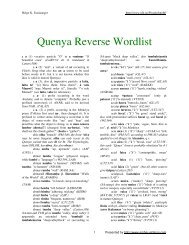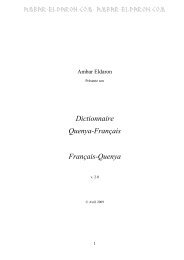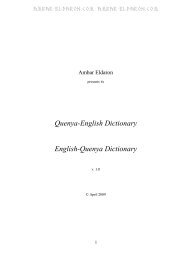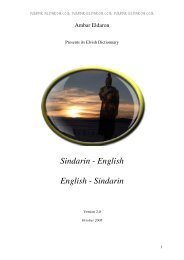English – Quenya - Ambar Eldaron
English – Quenya - Ambar Eldaron
English – Quenya - Ambar Eldaron
Create successful ePaper yourself
Turn your PDF publications into a flip-book with our unique Google optimized e-Paper software.
Helge K. Fauskanger http://www.uib.no/People/hnohf/<br />
"lion".) TRUNCATED ARM, see STUB, STUMP.<br />
<strong>–</strong>RAK<br />
ARMY hossë (band, troop) <strong>–</strong>LT2:340<br />
ARNOR Arnanor, Arnanórë ("royal land")<br />
<strong>–</strong>Letters:428<br />
ARRANGEMENT pano (plan). Note: the<br />
word also means “piece of shaped wood”. <strong>–</strong><br />
QL.72<br />
ARRIVE: The verb ten- is used for this<br />
meaning in one source (present tense téna “is<br />
on point of arrival, is just coming to the end”).<br />
Other attested forms are tenë (aorist; 1st person<br />
tenin), pa.t. tennë “arrived, reached” (“usually<br />
used with locative not allative”: tennen sís “I<br />
arrive[d] here”), perfect eténië, future tenuva<br />
“will arrive”. Tolkien subsequently changed ten-<br />
to men-, but the latter is elsewhere ascribed the<br />
meaning “go”. <strong>–</strong>VT49:23-24<br />
ARROW pilin (pilind-, as in the pl. pilindi)<br />
<strong>–</strong>PÍLIM<br />
ART Carmë (making, production); BLACK<br />
ARTS núlë (sorcery). (The word is spelt “ñúle” in<br />
the source, reflecting the older pronunciation; in<br />
Tengwar spelling the initial nasal should<br />
therefore be represented by the letter Noldo). <strong>–</strong><br />
UT:396, PE17:125<br />
ARTIFICIAL CAVE hróta (dwelling<br />
underground, rockhewn hall) <strong>–</strong>PM:365<br />
AS (prep) ve (like). The longer variant sívë<br />
appears to introduce a comparison with<br />
something that is near to the point or thought of<br />
the speaker, whereas tambë introduces a<br />
comparison with something remote, as in<br />
Tolkien's translation of one line from the Lord's<br />
Prayer: cemendë tambë Erumandë "on earth<br />
as in heaven" ("heaven" being remote <strong>–</strong> we may<br />
theorize that "in heaven as [here] on earth"<br />
would translate as *Erumandë sívë cemendë,<br />
since "earth" would represent the position of the<br />
speaker). NOTE: a homophone sívë means<br />
"peace". The word yan, related to the relative ya<br />
“which”, is also defined “as” in one text<br />
(VT49:18). AS REGARDS pa, pá (concerning,<br />
touching). AS USUAL ve senwa (also ve senya,<br />
but see USUAL). <strong>–</strong>Nam/RGEO:66, 67, VT43:12,<br />
38, VT44:26, VT49:22<br />
ASCENT rosta, ASCENSION orosta <strong>–</strong><br />
LT1:267, 256<br />
ASGARD Valinor, Valinórë (Tolkien<br />
actually uses this gloss of Valinor, as Asgard is<br />
the City of the Gods in Norse mythology) <strong>–</strong><br />
LT1:272<br />
ASIDE <strong>–</strong> stand aside! heca! <strong>–</strong> also with<br />
pronominal affixes: sg hecat, pl hecal "you stay<br />
aside!" (be gone!) LEAVING ASIDE hequa (not<br />
counting, excluding, except) <strong>–</strong>WJ:364, 365<br />
*ASK #maquet- (only pa.t. maquentë is<br />
attested. The word is not translated, but<br />
undoubtedly means "asked": 'Mana i·coimas<br />
in·<strong>Eldaron</strong>?' maquentë Elendil [PM:403]. The<br />
question itself is translated "What is the coimas<br />
of the Eldar?", so the rest must be "Elendil<br />
asked". Furthermore, maquentë is transparently<br />
quentë "said" with the interrogative element ma<br />
[PM:357] prefixed.) ASK FOR <strong>–</strong> see DEMAND.<br />
ASLEEP lorna <strong>–</strong>LOS<br />
ASSEMBLE hosta- (gather, collect) <strong>–</strong><br />
MC:223<br />
ASSOCIATE otorno (sworn brother)<br />
osellë (Þ) (sworn sister) <strong>–</strong>TOR, THEL<br />
ASTRONOMER meneldil <strong>–</strong>Letters:386<br />
AT sé, se (the form with a long vowel may<br />
be preferred since se is apparently also a 3rd<br />
person pronoun) (in). The locative case may also<br />
express “at”, e.g. lúmissen “at the times”. <strong>–</strong><br />
VT43:30, 34, VT49:47<br />
ATHELAS (a healing plant) asëa; see<br />
KINGSFOIL. <strong>–</strong>PE148<br />
ATHWART arta (across) (Note: arta also<br />
means "fort, fortress"); GO ATHWART tara-<br />
(cross) <strong>–</strong>LT2:335, 347<br />
AUGER teret (gimlet) <strong>–</strong>LT1:255<br />
AUGMENT (vb.) yantya- (add) <strong>–</strong>PE15:68%<br />
AUGUST Urimë (so in LotR; UT has<br />
Úrimë) <strong>–</strong>LotR:1144, UT:302/470<br />
AUTHORITY Máhan (pl Máhani is given,<br />
but seems perfectly regular). Tolkien once stated<br />
that Valar should strictly be translated "the<br />
Authorities" (MR:350), but Vala obviously cannot<br />
be used to translate "authority" in general; it was<br />
used only of the Valar themselves (WJ:404). Cf.<br />
also adj. valya "having (divine) authority or<br />
power". Máhani was adopted from Valarin and<br />
originally probably referred to the Valar<br />
themselves. We are not told whether Máhan<br />
could or should be applied to a non-divine<br />
authority (at least it should not be capitalized if<br />
so used). Note: Máhan means *"Supreme One"<br />
rather than "authority" as an abstract. <strong>–</strong>MR:350,<br />
BAL, WJ:399/402<br />
AUTUMN yávië (harvest <strong>–</strong> in the Calendar<br />
of Imladris, yávië was a precisely defined period<br />
of 54 days, but the word was also used without<br />
any exact definition), lasselanta ("leaf-fall", used<br />
of the beginning of winter or as a synonym of<br />
quellë; see FADING. Also spelt lasse-lanta with<br />
a hyphen), narquelion ("fire-fading" <strong>–</strong> this word<br />
from Fíriel's Song and Etym seems to<br />
correspond to narquelië in LotR, but the latter is<br />
the name of the month corresponding to our<br />
October.) LT1:273 has yávan "autumn, harvest",<br />
but this word may be obsoleted by yávië. <strong>–</strong><br />
Wordlist last updated July 5th, 2008 6 Presented by http://www.ambar-eldaron.com



